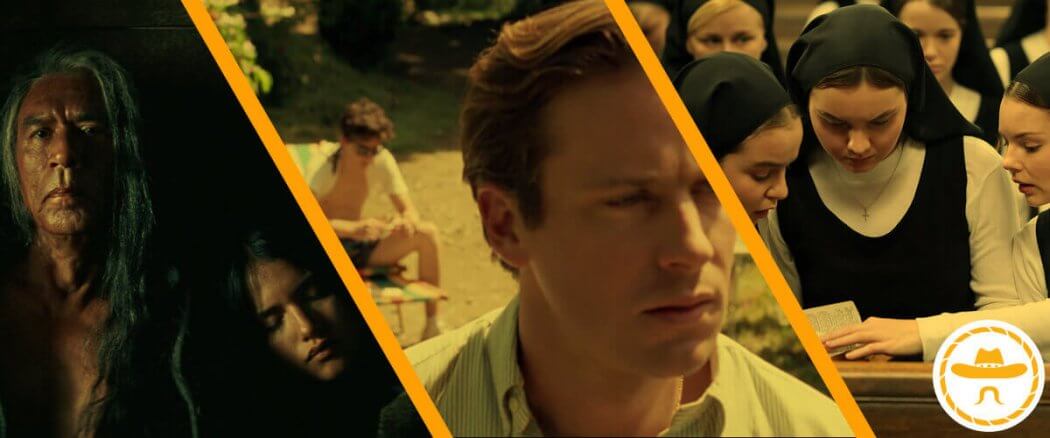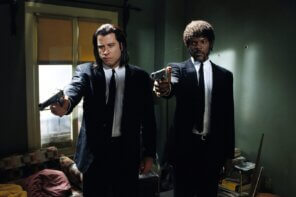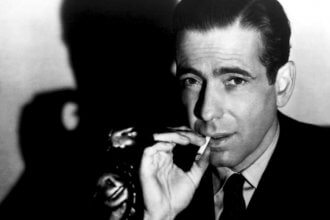Welcome to another edition of Mini-Review Roundup where we present smaller reviews of several movies at once. Up this month: Novitiate, Hostiles, and Call Me by Your Name.
Novitiate
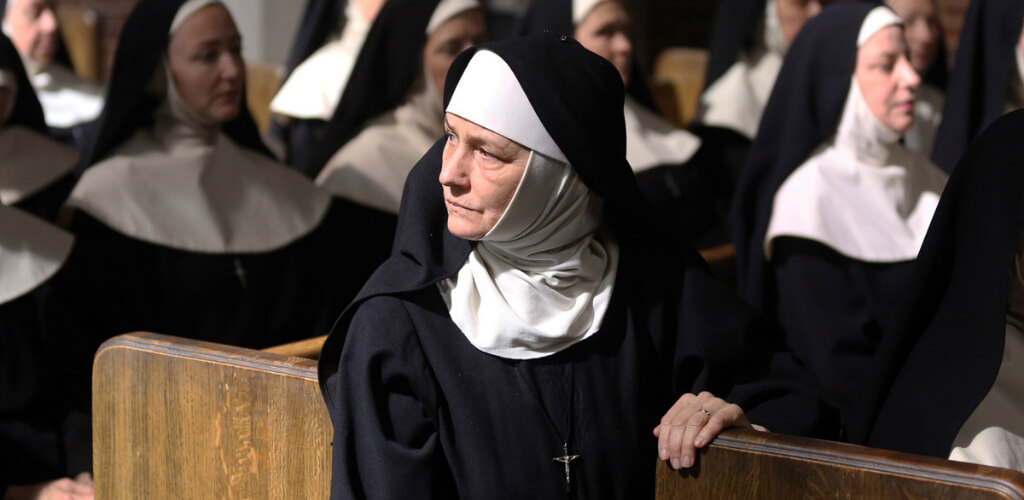
Nothing scares me more than a movie about faith. I’ll take a tank full of sharks over watching the foundation of my life butchered on screen. Christian movies are the obvious culprit. One-dimensional spiritual giant helps one-dimensional struggling Christian overcome their problems and experience “the peace that passes all understanding.” Make it quick, sharks. Mainstream movies fare better, but can also crash-land in the other direction. Profanity-spouting preacher shares the love of Jesus with his congregants when he’s not self-destructing from a wicked temper and alcohol problem. Cue the Jaws music. We need movies about faith that find the balance between reverence and honesty. We need movies like Novitiate.
In the Catholic Church, the novitiate is the period of training that people undergo before pledging lifelong service. They are free to leave at any time during this period, and they are also free to be dismissed. Cathleen (Margaret Qualley) has no doubt that she is ready to give her life to the Church. This comes as a shock to her mother Nora (Julianne Nicholson) who allowed her daughter to attend a nearby Catholic school because it was free, not knowing she would take the religion part seriously. Nicholson’s performance has been overlooked this awards season, but I haven’t forgotten it. She embodies the impossible position every parent must face of not understanding your child’s choices, but loving them too much not to try.
Novitiate succeeds where so many faith-based movies fail by showing the genuine beauty of a life devoted to God. Cathleen loves dwelling in the church sanctuary. Candles flicker around her as she kneels before a statue of Jesus. First-time writer/director Margaret Betts conducts these scenes with restraint and power. The cinematography is gorgeous; the score perfect. For once, we catch an authentic glimpse of what faith feels like for those that have been captured by it.
But Betts isn’t afraid to show the dark side as well. The woman overseeing Cathleen’s novitiate is a towering authoritarian with the title of Reverend Mother (Melissa Leo). Reverend Mother tells the aspiring nuns on their first day, “Since God can’t be here to run this convent himself, my voice will serve as a stand-in for his.” She is quick to pounce on her student’s faults, humiliating them into submission. When one girl greets her during a time supposed to be devoted to silence, Reverend Mother makes her crawl on the ground begging for forgiveness. Leo’s performance is captivating. She was inexplicably snubbed by the Oscars, but I’d swap her out for Lesley Manville or Octavia Spencer’s nominations any day.
Novitiate touches on one of the central themes of the Christian faith: law vs. grace. The film takes place during Vatican II when the Catholic Church began loosening their rules to be more inviting and inclusive such as relaxing the dress codes of nuns and abolishing primitive punishment practices. For Reverend Mother, the new rules are the death of everything she holds dear. She sobs while reading them to her fellow nuns. Her entire identity is bound in them, and the girls of the convent suffer under their weight.
Most of the nuns at the convent made vows to the Church at age 16. As they grow older, they discover desires that have no outlet. They seek intimacy in their bodies and each other, only to be racked with guilt. Reverend Mother is no help to them. The law has no tolerance for sinners.
At one point, a priest asks one of the girls “What do you seek?” Her response is the inevitable cry of a life stuck in the hamster wheel of law: “Something more.”
Grade: A-
Hostiles
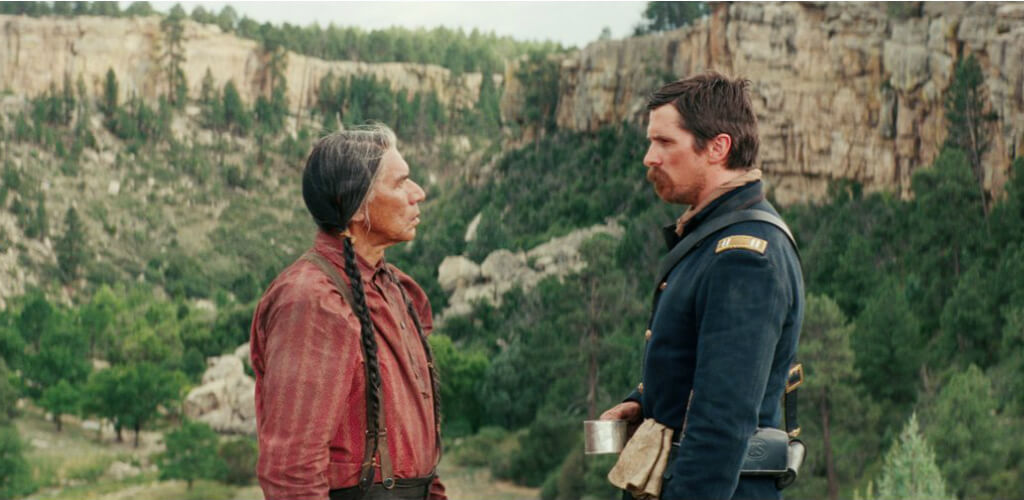
Is there a better actor working today than Christian Bale? Maybe Daniel-Day Lewis, but he’s retired now (until Paul Thomas Anderson twists his arm, that is). Like Lewis, Bale is a method actor which involves a total commitment to inhabiting a character, even when the cameras aren’t rolling. Bale lost 63 pounds to play a skin-and-bones insomniac in The Machinist, only to gain back 100 pounds plus a six-pack for Batman Begins six months later. But it’s more than just the physical — Bale creates a different soul for every character he plays, and the one he embodies in Hostiles is as tortured as they come.
When we catch up with Bale’s Captain Joseph Blocker, he’s at the end of his military career. The year is 1892 and Blocker is stationed at Fort Berringer, New Mexico. He’s stoic and quiet now, but we hear glimpses of a notorious past. Blocker has spent years waging a long and bloody fight against Native Americans. He speaks their language, but that’s where the similarities end. Native Americans are nothing more than “savages” to Blocker. He has a running list of the friends they’ve killed, and he’s taken pleasure in killing them right back. But all of that’s behind him. Blocker is about to enter a pension-filled retirement. There’s just one more assignment his commanding officer has for him: escort his most hated enemy, a dying Native American prisoner named Yellow Hawk, to live in freedom at his home in the Valley of the Bears, Montana.
Hostiles is written and directed by Scott Cooper and bears a resemblance in quality to the rest of his filmography: mediocre movies elevated by outstanding performances. He struggles to create three-dimensional characters, and his tone and pacing are scattershot. But just like Crazy Horse and Black Mass, Cooper has found an actor capable of carrying the film on his back. Bale is terrific as usual, and in a less crowded year could have been nominated for Best Actor. He conveys so much in his eyes. Every close-up reveals a life of anger, weariness, and shame.
Blocker’s struggle with Yellow Hawk (Wes Studi) uncovers the relative morality of war. Though Yellow Hawk is officially a free man at the start of their journey to Montana, Blocker wastes no time putting him in his place. He orders his men to put chains on Yellow Hawk and his family and gives them freedom to shoot if they step out of line. After all, Yellow Hawk is a killer. He’s spilled the blood of men, and he might do it again. And yet, Blocker is a killer too. What separates the two of them? What makes one righteous and the other wicked? When people fight in wars to defend our land, we call them patriots. When the Native Americans did it, we called them savages. The righteousness of war it would seem is nothing more than a matter of perspective.
The tagline for the film is “We are all hostiles.” There’s an element of truth to this, but so often we use these phrases to skirt responsibility. Blocker can sleep at night because Yellow Hawk is a “hostile” too. But soon enough, he comes face to face with his humanity, thanks in no small part to the kindness Yellow Hawk’s family shows him. The oppressed shouldn’t have to bear the burden of grace, but when they do they’re walking in the footsteps of Jesus.
Repentance is costly. It might mean realizing we’re not the hero of the story. It might mean recognizing that the only thing separating “us” from “them” is power and privilege. Blocker finishes his mission a different man than when he started. The journey is long and change is messy, but the reward is freedom.
Grade: B
Call Me by Your Name

There is no debate more contentious in the Church today than LGBTQ inclusion. Churches are splitting and pastors are signing statements. Everyone feels the need to draw a line in the sand and state their position. But what often gets lost in the shuffle are the human lives at the center. People with the same fundamental desires as everyone else. People who are surely sick and tired of everyone talking about them. People who would prefer to be seen as the beautiful image-bearers they are.
Thankfully movies aren’t positions — they’re stories. That gives them the unique ability to cut through our biases and touch our hearts. If any film can do that, it’s Call Me by Your Name.
17-year-old Elio (Timothée Chalamet) lives an enviable life. He spends his days on the coast of Italy in a beautiful villa with two parents who love him. He’s young, precocious, and free. But nothing can prepare him for the new visitor that arrives at the start of the summer to intern for his father: an American named Oliver (Armie Hammer). From the moment Oliver shows up, Elio has no idea what to make of him. He’s confident and cocky, entering every new environment like he owns the place. He leaves the dinner table with a “later” and heads off to unknown destinations. Elio is both annoyed and fascinated by this strange American creature, and where their relationship leads will change him forever.
The acting from the two leads is extraordinary. Armie Hammer has had a steady career since breaking through in The Social Network, but this is the first chance he’s had to display the full range of his talent. Yet without question, this is Timothée Chalamet’s film. Chalamet is in every scene and his energy keeps the movie flowing. It’s a riveting performance — strong, tender, beautiful, and alive. He’s an Oscar nominee now. Every door in Hollywood is open to him, and he’s just getting started.
But there’s a third main character in Call Me by Your Name: Italy. I can’t recall a film where setting plays such a crucial role in the aesthetic and themes. Director Luca Guadagnino drenches every shot in breathtaking beauty. We see the world through Elio’s eyes, and Elio is a 17-year-old boy drowning in desire. Fruit and food are on every table. Perfectly toned bodies lie in sunglasses next to flowing streams. Rain falls through the Italian countryside on fertile wildlife brimming with possibility.
Who can forget the unquenchable lust of youth? Unfortunately, this is where the Church led many of us astray. Well-intentioned leaders taught us that our bodies were evil, so we snapped our wrists with rubber bands and stumbled down a path of confusion and shame. Call Me by Your Name shows a different way. Near the end of the film, Elio and his father (Michael Stuhlbarg) have a heart-to-heart. Unbeknownst to Elio, his father knows everything he’s been going through. But rather than give him “the talk,” Elio’s father gets down on his level and offers his love.
There is a time and place to have honest discussions about sexuality as Christians, but may they always be had in the context of relationship and trust. And may they always be seasoned with the compassion and empathy Elio’s father brings to the table. We may not agree on everything, but what family does? Our love for Christ can bridge our differences, just as our love for film can recognize Call Me by Your Name as one of the best movies of 2017.
Grade: A-

